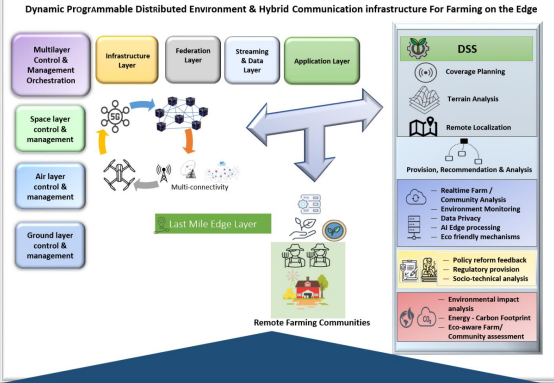AGRARIAN
Project Information
Title: SpAce-AIr-Ground Last Mile InfRastructure & Dynamic PrOgrAmmable DistRibuted EnvIronment For Edge FArmiNg
Funded under: Horizon Europe
Overall budget: € 5.821.476,25
Home page: agrarian-project.eu
Role of TUC indigo team
Principal Investigator of CIHEAM-MAICh
Project Description
In recent years, agriculture has faced many challenges, from a growing global population to be fed, the work power evasion in the sector, to sustainability requirements and environmental constraints. There are several roadblocks in digitization of the agriculture industry both technical and socio-economic. Agricultural data comes from multiple heterogeneous sources such as thousands of individual farmlands, animal factories, and enterprise applications and IoT and smartsensors provide huge volumes of data. Data quality, security and storage and the lack of decentralised data management systems is a major roadblock for the adoption of smart farming practises. These data have traditionally been processed in the Cloud. However, Cloud processing introduces limitations pertaining to timeliness, privacy, localization, latency and cost of operations. To alleviate these problems, edge/fog computing has been used as a paradigm for distributed processing, undertaking a portion of processing close to where data is produced and consumed. Combine this with the use of low power edge systems and proper management of last mile communications, optimisation of energy consumption can be achieved.
To enable tailored open-source digital solutions that will enhance sustainability performance and competitiveness of the sector, AGRARIAN will focus on the design of an open and highly dynamic environment (TRL 5-7) with respect to the tools, reuse, composability and orchestration. AGRARIAN will leverage mature and sophisticated technologies addressing the requirements of different workloads, including batch analytics, interactive, streaming data etc. so as to utilise the existing applications and developer base. AGRARIAN will develop a new programming environment and tools for the automated refactoring of existing and/or new applications and data management frameworks so they can operate in edge-based deployments as well as new edge-native programming abstractions and middleware.

Based on widely accepted open source technologies and adoption of container-based technologies and orchestrators, such as Kubernetes, AGRARIAN will provide a dynamic environment that will accommodate different workloads in combination with the demand for high responsiveness and the efficient use of backhaul bandwidth. Major efforts will be allocated in issuesthat affect how data, models, and processing are shared across AI clients and applications and to the challenges related to dealing with different types of biases that may arise due to contextualized use of AI. This will require new mechanisms for managing the model accuracy, fairness, and other important metrics.
AGRARIAN should leverage hardware-level, localized data analytics, security-centric acceleration, deploying new detection, prevention, and containment strategies at the edge and richer trust models. The concept will require a Communication infrastructure that mustsupport mobile and nomadic applications and digital tools in areas with weak connectivity; AGRARIA proposed infrastructure will bring three major improvements: a reduction in latency and jitter so that control-oriented applications are possible; a significant increase in bandwidth, enabling data to flow at the volumes and velocity demanded by emerging applications; and finally, a high degree of automation, permitting quality-of-service performance beyond the best-effort delivery on the existing Internet.
AGRARIAN platform aims to offer: Smart connectivity for secure access to any of the relevant network infrastructure options; Ability to dynamically meet latency, configuration and other requirements of each of the different network technologies; Integration of edge and cloud for a transparent infrastructure to organize and deploy software components on demand; Uniform management of distributed digital infrastructure for different edge types, cloud components and services; Dynamic deployment and provisioning of services and applications that are time- and location-dependent; Management of data to maintain data security and optimize data processing; Optimisation of operations in terms of energy consumption by enabling new tools and apps for field operations and resource use; A strong ADSS (Agricultural Decision Support System) tool that will take into consideration all specificities of farmers in rural communities and will propose the appropriate technology for the last mile and the corresponding business model to maximize benefit for all actors. AGRARIAN ADSS will be data, communication and knowledge driven allowing the development of apps and tools as per user’s needs. ADSS will rely on a simple GUI, re-planning components and prediction abilities so adopt to dynamic situations.

